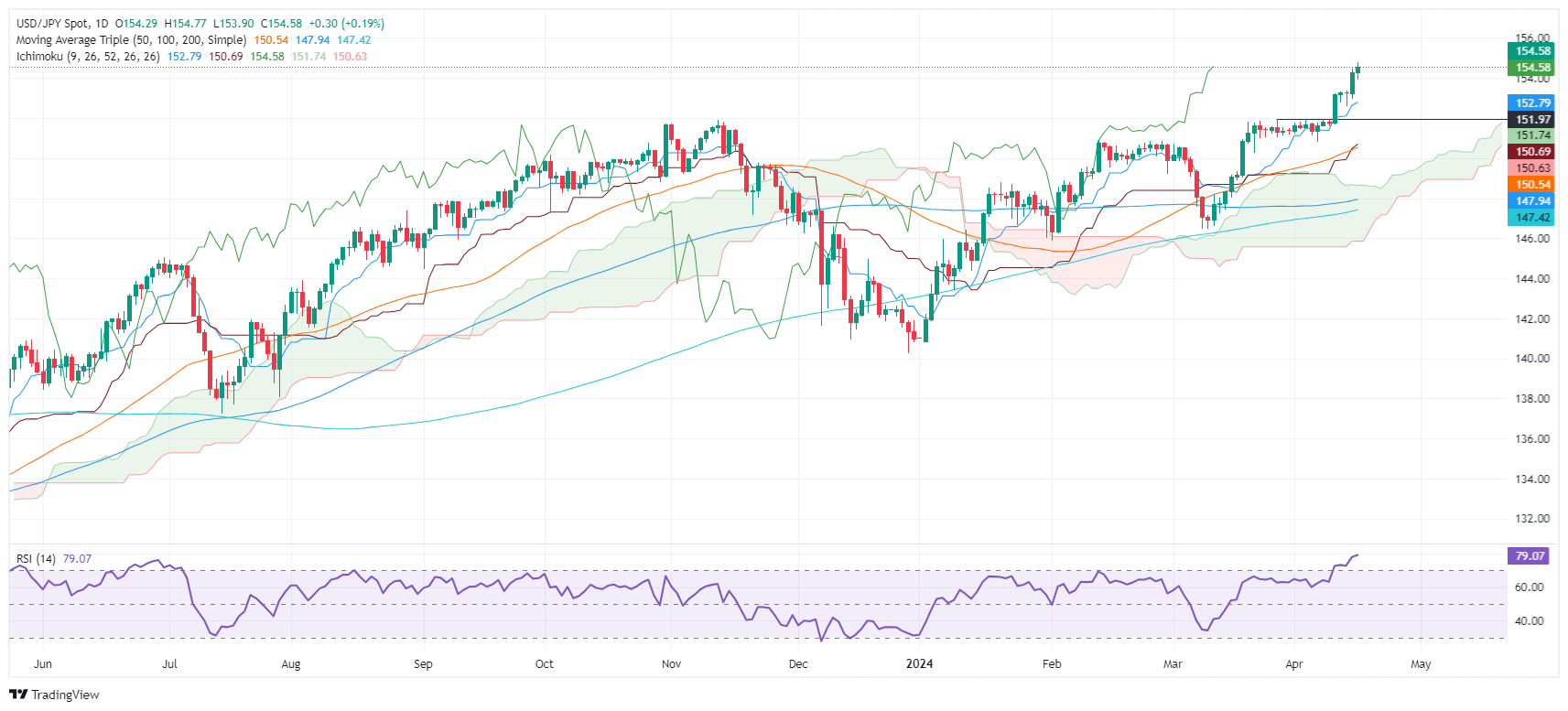- The USD/JPY pair advances driven by good US retail trade data, which strengthens the Dollar against the Yen.
- US housing indicators falter as building permits and housing starts underperform, pointing to a slowdown in the construction sector.
- US industrial production remains stable, underscoring a mixed but resilient economic environment.
- Japanese Finance Minister Suzuki emphasizes surveillance of the foreign exchange market.
The US Dollar posts gains against the Japanese Yen in early trading of the North American session. Strong economic data from the United States and neutral to hawkish comments from Federal Reserve officials boosted the dollar. The USD/JPY pair is trading at 154.61, 0.22% above its opening price.
USD/JPY surpasses 154.00, amid retail sales data and Fed comments, from neutral to hawkish
US housing data was weaker, revealing that builders may be taking a breather from high inventory levels. Construction permits in March decreased 4.3%, with figures falling to 1,458 million, below estimates of 1,514 million and 1,523 million in February. Consequently, Housing Starts plummeted by -14.7%, going from 1,549 million to 1,321 million, below the forecasts of 1.48 million.
Other data released by the US Federal Reserve (Fed) showed that industrial production in March remained unchanged at 0.4% monthly.
Despite this, Monday's strong retail sales data sparked a reaction in the fixed income market, as US Treasury yields rose more than 10 basis points over the week. Traders had reduced their bets that the Fed could cut rates twice instead of three times, as reflected in data from the Chicago Board of Trade (CBOT). The Fed is expected to place the main reference rate at 4.965% towards the end of 2024.
On Monday, San Francisco Fed President Mary Daly said the US central bank is in no rush to ease monetary policy. Meanwhile, USD/JPY traders await speeches from Fed Governor Jefferson, New York Fed President John Williams and Chairman Jerome Powell.
According to Finance Minister Suzuki, Japanese authorities have remained steadfast in “closely monitoring the latest developments” in the foreign exchange market. Market participants had pushed the exchange rate beyond the 154.00 threshold, and no reaction from the Bank of Japan (BoJ) or the MoF could keep the rally alive.
USD/JPY Price Analysis: Technical Outlook

USD/JPY remains biased higher, and without clear signs of intervention, USD/JPY buyers could lead the exchange rate to challenge 155.00. Once broken, the next stop would be 155.78, followed by the last cycle high at 160.32. On the other hand, if the pair falls below 154.00, it could open the door to a pullback to the April 12 high that became support at 153.38 before falling to 153.00.
Japanese Yen FAQ
The Japanese yen (JPY) is one of the most traded currencies in the world. Its value is determined broadly by the performance of the Japanese economy, but more specifically by the policy of the Bank of Japan, the differential between the yield of Japanese and US bonds, or the risk sentiment of operators, among other factors. .
One of the Bank of Japan's mandates is currency control, so its movements are key for the yen. The BoJ has intervened directly in currency markets on some occasions, usually to lower the value of the yen, although it often refrains from doing so due to political concerns among its major trading partners. The BoJ's current ultra-loose monetary policy, based on massive stimulus to the economy, has caused the yen to depreciate against its major peers. This process has been exacerbated more recently by a growing policy divergence between the Bank of Japan and the other major central banks, which have chosen to sharply increase interest rates to combat inflation levels that are at their highest levels for decades.
The BoJ's stance of maintaining ultra-loose monetary policy has led to an increase in policy divergence with other central banks, particularly the US Federal Reserve. This supports a widening of the spread between US and Japanese bonds to 10 years, which favors the US Dollar against the Japanese Yen.
The Japanese yen is often considered a safe haven investment. This means that in times of market stress, investors are more likely to put their money in the Japanese currency due to its supposed reliability and stability. In turbulent times, the yen is likely to appreciate against other currencies that are considered riskier to invest in.
Source: Fx Street
I am Joshua Winder, a senior-level journalist and editor at World Stock Market. I specialize in covering news related to the stock market and economic trends. With more than 8 years of experience in this field, I have become an expert in financial reporting.







